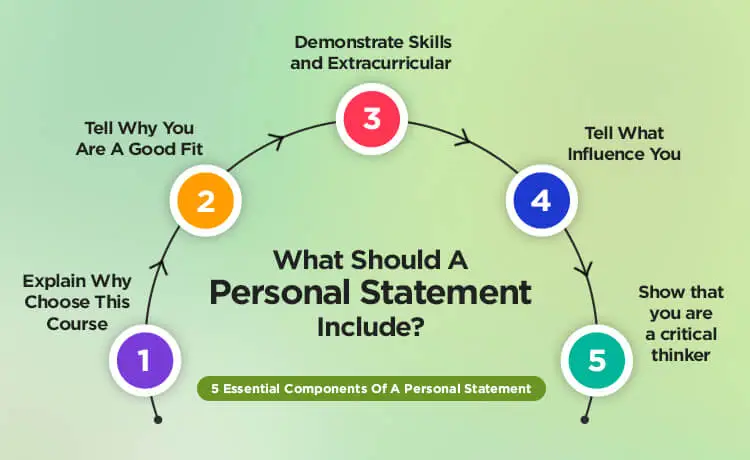When it comes to applying for university, your personal statement is your golden ticket to making a memorable impression.
This document allows you to showcase who you are beyond your grades and test scores, giving admissions committees a glimpse into your personality, experiences, and aspirations. But what should a personal statement include for university?
Writing your statement is an opportunity to let the university know all about yourself, your ambition, and why you are passionate about the course you want to study. You need to be sure you have a full understanding of what a personal statement is and what should be included.
By doing this, you not only have decided on what you would spend three years of your life doing, you also one of the few persons to make it into their first choice of university and course of study.
In this writing, we will explore and break down the 17 essential elements that can help you craft a compelling personal statement that increases your chances of securing a spot at your dream institution.
Table of contents
- What Should a Personal Statement Include for University?
- Interest in the Course:
- What Led You to This Course:
- Joint Honours Course:
- Prove That You’re Passionate:
- Schemes Related to the Course:
- Why You’re the Perfect Student for This Course:
- Interpersonal Skills:
- Academic Skills:
- Employment Experience:
- Volunteer Experience:
- Personal Circumstances Affecting Educational Performance:
- Your Achievements:
- Hobbies and Extracurriculars:
- What Makes You Interesting and Unique:
- General Ability to Fit into Uni Life:
- Your Ambitions:
- A Summary of Everything You’ve Mentioned:
- Conclusion
- Frequently Asked Questions
- References
- Recommendations
What Should a Personal Statement Include for University?
Interest in the Course:
It’s crucial to express your genuine interest in the course you’re applying for so that universities understand your dedication to studying under their guidance. Universities value students who enjoy their courses, as this enthusiasm boosts motivation and academic performance.
The opening section of your personal statement should focus on the course, explaining why you’re excited to pursue it. Provide evidence to demonstrate your passion for the subject matter, convincing the admissions committee that you belong at their institution.
Read also: 10 Best Cognitive Science Colleges 2024 | Cost & Scholarship
What Led You to This Course:
The admissions committee is interested in why you want to study your chosen course, as it reveals more about you than the course itself. Reflect on the events, people, or experiences that ignited your passion for this field.
Tell your unique story and explain how it led you to apply for the course. Be sure to provide compelling reasons for your choice, moving beyond a simple statement like “I enjoy the subject” to make a convincing case for your admission. It is one of the things a personal statement should include for university.
Joint Honours Course:
If you’re applying for a joint honors course, clarify why you want to study these subjects together and how they complement each other. Highlight the connection between the subjects and explain how this combination fits into your long-term plans.
For closely related subjects, it’s easier to discuss both throughout your personal statement. For less obvious connections, focus on one subject first, then link it to the second to make a strong case for your choice.
Prove That You’re Passionate:
Demonstrate your passion for the course by discussing relevant work experience and super-curricular activities. Talk about how these experiences improved your skills and influenced your views on the course.
Mention any books, podcasts, or related activities that broadened your understanding of the subject. Universities value self-motivation and critical thinking skills, so highlight how these experiences helped you develop these qualities.
Check out: 10 Best Landscape Architecture Colleges 2024 | Scholarships
Participating in higher education taster courses, summer schools, or similar programs showcases your commitment to excelling at university. Websites like UniTasterDays and Springpod can help you find relevant courses.
Discussing your participation in such schemes provides concrete evidence of your intention to succeed at university and pursue your academic goals.
Why You’re the Perfect Student for This Course:
Refer to the university’s values and priorities outlined in their prospectuses to explain why you’re an ideal candidate.
Highlight qualities like a strong work ethic, enthusiasm for learning, and the ability to handle pressure, aligning them with your own characteristics. This section should emphasize how you embody the qualities the university seeks in its students. It is one of the things a personal statement should include for university.
Interpersonal Skills:
While independence is crucial, the ability to collaborate effectively with others is equally important. Developing your interpersonal skills means gaining confidence in working alongside individuals with diverse personalities and backgrounds. To further enhance these skills, consider seeking tailored advice for prospective university students from Skills You Need.
Additionally, it’s worth noting that universities, like employers, value “soft” skills. These skills are applicable to university life as well. Exploring examples that employers consider important can offer valuable insights into the qualities universities may appreciate in their students.
Mention these skills when discussing experiences such as participating in the National Citizen Service (NCS) and the Duke of Edinburgh’s Award (DofE). You can also weave them into your descriptions of work experience, volunteering, or part-time jobs you’ve undertaken.
If you’re struggling to identify your skills, don’t hesitate to seek input from friends and family. However, avoid directly quoting them, as this may make you appear unsure of yourself and overly reliant on others.
See also: What Majors Is John Hopkins Known For In 2024 | Full Guide
Academic Skills:
Academic success hinges on possessing the right skills, which is why universities prioritize them. Some academic skills overlap with interpersonal skills.
Critical thinking stands out as one of the most vital skills for university. It involves the ability to analyze information sources, regardless of the subject. You can showcase this skill during interviews or link it to your super-curricular activities.
Time management and organizational skills also hold great importance, especially as university brings increased independence. If you’ve developed these skills through activities such as running a club or tutoring, provide examples in your personal statement. Highlighting your ability to manage your time effectively is particularly relevant and impressive.
Employment Experience:
If you’ve had a job related to your chosen course of study, share your experiences. Discuss how your job, even if seemingly unrelated, may have confirmed your passion for the subject or developed valuable skills. Think about the benefits your job has provided and how they relate to university studies or the specific course.
For mature students who’ve spent years in the workforce, consider addressing why you decided to go part-time or pursue higher education. Your reasons, whether a desire for personal fulfillment or a shift toward what you genuinely love, offer insights into your motivation and determination.
Read also: How To Study For The ACT In Less Time | 2024 Timetable, Schedules
Volunteer Experience:
Volunteer experiences, although unpaid, demonstrate your commitment to gaining relevant skills and your passion for the subject. Whether you organized the volunteer work yourself or participated through your educational institution, these experiences hold value.
If you haven’t volunteered yet but are preparing your personal statement early, don’t worry. You still have time to find a placement. Consider volunteering in roles that enhance communication and organizational skills, such as working in a charity shop or assisting in a school.
Personal Circumstances Affecting Educational Performance:
While you shouldn’t dwell on personal circumstances, it’s essential to mention any extenuating factors that have affected your academic performance. This could include physical or mental health issues, bereavement, or caregiving responsibilities. Discuss how these circumstances impacted your ability to study, demonstrating your determination to succeed despite challenges.
You don’t need to provide extensive details if you’re uncomfortable doing so. Instead, focus on the general impact and its influence on your grades. Ensure your teachers also mention these circumstances in their references to support your explanation.
Check out the latest Purdue Acceptance Rate By Major In 2024
Your Achievements:
Universities are interested in your achievements, particularly those related to your chosen subject. Highlight both personal and academic accomplishments in your personal statement. These could include winning awards like the Jack Petchey (Achievement) Award or participating in events such as the Speak Out Challenge. Academic achievements like winning competitions or organizing events are also noteworthy.
While discussing achievements, maintain a humble tone. Universities appreciate confident students but not those who come across as arrogant. It is one of the things a personal statement should include.
Hobbies and Extracurriculars:
Only discuss relevant hobbies and extracurricular activities in your personal statement. Universities want to know about you as a person, but they are primarily interested in your suitability for the course. Link your hobbies and activities to your course when possible. If an extracurricular activity has enhanced your skills, describe it as part of your overall narrative.
Prioritize activities in which you held official roles or responsibilities, as they demonstrate leadership and communication skills.
See also: 15 Best Game and Interactive Media Design Colleges 2024
What Makes You Interesting and Unique:
To stand out among applicants, showcase what makes you unique and memorable. Think outside the box and offer the admissions committee something to remember you by. Avoid using famous quotes, as they may be overused by multiple applicants. Your personal statement should reflect your authentic voice and original thoughts.
General Ability to Fit into Uni Life:
Your personal statement should convey why you’ll seamlessly integrate into university life. Discuss your various skills and, of course, your passion for the course you’re applying to.
If you’ve visited friends or relatives at university and gained insights into the student experience, mention it (if true). Consider mentioning societies you’d like to join if you’re struggling to find relevant points, ensuring they align with the universities you’re applying to.
Your Ambitions:
Share your plans for the future regarding the course you’re applying for. Do you intend to pursue a master’s or PhD? Are you targeting specific job opportunities? Focus on immediate goals rather than long-term ambitions. This demonstrates your commitment to the subject and your eagerness to succeed.
Avoid dwelling too long on your ambitions, as universities are more interested in what you’ll bring to their institution than what you’ll do after completing the degree.
Read also: 10 Best Rice University Majors For College Students In 2024
A Summary of Everything You’ve Mentioned:
Consider concluding your personal statement by summarizing your key points. Avoid repetition, and find fresh ways to reiterate your main messages. This concise recap helps leave a strong and memorable impression on the admissions committee.
These 17 things will help you create a comprehensive and compelling personal statement that showcases your passion, qualifications, and suitability for your chosen course and university. Remember to keep your personal statement concise and focused while addressing these key aspects to leave a lasting impression on the admissions committee.
Check out: How To Study For Anatomy And Physiology Test In The Shortest Time
Conclusion
In crafting your personal statement for university, remember that it’s your chance to shine and stand out in a sea of applicants. It can be your ticket to a life-changing study opportunity and a profitable career. To ensure that you create a personal statement that paints a vivid picture of who you are and why you’re the perfect fit for the university of your dreams, you wiil need to follow the above listed guidelines.
also: How To Use Social Media Wisely For Students | 10 Effective Tips
Frequently Asked Questions
A personal statement is a written document that accompanies your university application. It’s important because it allows you to express your motivations, experiences, and aspirations, helping the admissions committee understand why you’re a great fit for their program.
Yes, a strong introduction can grab the reader’s attention. Begin with an engaging story or a thought-provoking statement to make a memorable first impression.
Discuss your academic accomplishments, but go beyond listing grades. Explain how these achievements shaped your interest in the field you’re pursuing.
Absolutely! Discuss your involvement in clubs, sports, or volunteer work. Show how these activities demonstrate your leadership, teamwork, and personal growth.
Yes, it’s crucial to share your career aspirations. Explain how the university’s program aligns with your goals and why it’s the right place for you to pursue them.
References
- thinkstudent.co.uk– what should a personal statement include
- acrosophy.co.uk– 17 things to include in a personal statement for the University
- universitycompare.com– What to include in a personal statement
- bc.ac.uk– what should a personal statement include



